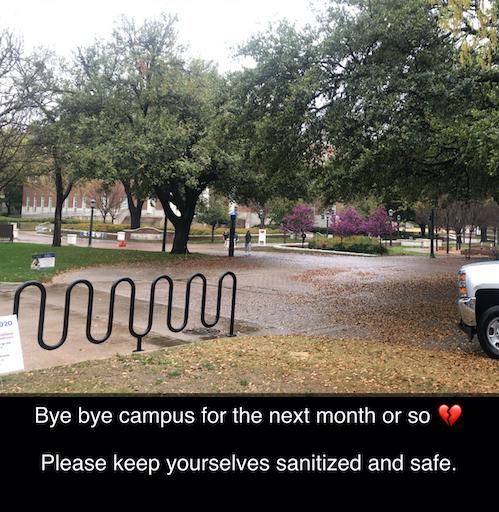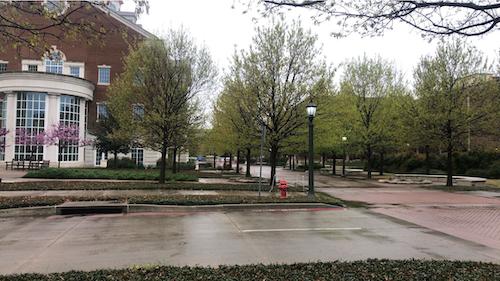DALLAS- It’s gloomy, chilly and the SMU campus is unusually quiet for a Wednesday afternoon. Lockdown has begun and students have cleared out on campus. At SMU, three students have already tested positive for the virus. Later that afternoon, the World Health Organization confirmed COVID-19 as a pandemic.
I remember two days prior to the start of the pandemic, I had gone to the Kroger off Mockingbird and Greenville to grab lunch. I was thoroughly confused as the store flooded with panicked shoppers. In their baskets, multiple packages of toilet paper, cases of water, and a surplus of canned foods. That was just the beginning.On my last day on campus, I was walking to my car and stopped to take pictures to remember the moment. It had begun to rain as I captured the spring flowers on the trees amid the gloom of the rain. I posted the photo on Snapchat and wrote “Bye-bye campus for the next month or so. Please keep yourselves sanitized and safe.”
I never thought we would exceed a month of online Zoom classes. I really expected us to go back and finish the semester on campus, little did I know we would not be back for six months.

It’s been exactly a year since that day and so much has changed. Since the start of the lockdown, the struggles we have faced in this country have been heartbreaking. Who would have known the most stressful thing then was where to find toilet paper? The loss of lives from this virus is baffling. Today, the CDC website reports over 500,000 deaths from COVID-19, just in the United States alone.
No one can say they’ve had it worse than anyone else because we have all struggled in this pandemic, in our own unique ways.
Some of us struggled with mental health, some of us lost loved ones, some of us lost jobs and financial security, some of us lost time, and maybe even lost ourselves in quarantine; students have struggled with the implementation of “Zoom University”, while families have gone months without seeing each other to maintain social distancing.
We’ve lost a lot — as a country, as a nation. But I propose we look at this past year in a different light, instead.
Instead, let us ask ourselves: What have we gained this year?
As the one-year anniversary of the lockdown nears, I recommend a time of reflection.
What did we do this year that made a difference? How did we make a change, regardless of the emergent pandemic?
I contracted COVID-19 in July of 2020. At the time, I worked at Target, and the risk of getting the virus was extremely high considering the amount of people I was interacting with daily. I would be lying if I said I had minor symptoms and had an easy recovery. When I tested positive for the virus, I was terrified. It was one of the worst experiences of my life and has affected my health and heart, months later. What I can say positively, is that the experience made me value my life. Those several weeks quarantined, sick, and miserable, I came to realize how lucky I am to have only been sick temporarily. I was thankful to have survived it. Now, I choose to take every day with gratitude and appreciation for the breath I breathe.
UTD graduate Liliya Abie, explains how this year impacted her life, and what good came from it despite some hardships.
“I would say it’s definitely brought a new skill of resilience and a sense of adaptability,” Abie said.
She continued by saying that the adjustment to working from home caused her to develop anxiety, but despite getting COVID-19, the flu and losing her dog all within a month, she managed to stay optimistic.
“All of that makes you have an extra sense of gratitude. I even started a new relationship during the pandemic and that’s been a beautiful thing,” Abie said. “There’s always a rainbow after the rain!”
After the lockdown and schools shut down, many parents had to adapt to being home with their kids.
“As a single mother, I thought I was the most patient person in the world…but that was FAR from true,” Carley Nickerson said.
Nickerson, a UNT graduate, was working a full-time corporate job before the pandemic moved her to work from home.
“When my daughter throws a fit, I know it will come to an end, but the situation we faced this previous year had no definite answer,” Nickerson said.
She explains the results of high stress on her during the lockdown and how it led her to create a balance in her life.
“It was hard to find the same motivation but when I focused on meditation, being active, and fueling my body with healthy items, I noticed a difference,” Nickerson said.
She began crafting, painting, working with epoxy, creating vinyl’s, and working out to find her balance and says she feels healthier than she ever has before.
Some struggled with personal hardships beyond the virus this year but were able to find the bright side to being quarantined. SMU journalism student, Monica Figueroa, is thankful for the time she has spent at home this year.
“I got to spend more time with my mom,” Figueroa said. “It advanced relationships quicker than during a non-pandemic setting.”
If the pandemic would not have happened, Figueroa said she would not have had those precious moments with her mom. She holds on to every day as a treasure.
As we learn to treasure life now, we also have learned the value of humanity in the process. Experiencing an entire social movement during the pandemic, political climate changes, and increase in justice for human rights, has made impacts on us all.
Nora Jandres, a SMU student and Human Rights activist says they have reflected on herself this year more than ever before.
“[The pandemic] made me discontinue relationships with individuals who refuse to follow CDC guidelines or who refuse to advocate for human dignity,” Jandres said. “I have grown to be more conscious of humanity’s needs.”
In addition, the pandemic has brought new healthy habits, healthy lifestyles compared to the fast-paced life we once lived.
“Although there has been a lot of hardship and a lot of lives lost, there’s still a silver lining and opportunity that we must slow down and self-reflect,” Plano resident Christina Solis said. “My husband and I now go on daily, uninterrupted walks without technology.”
Solis says the “new normal” has become a lifestyle and she cherishes it more than what was “normal” before COVID.
“It makes us love who we are, the lives we live, and the value of life itself since the pandemic began,” she said.















